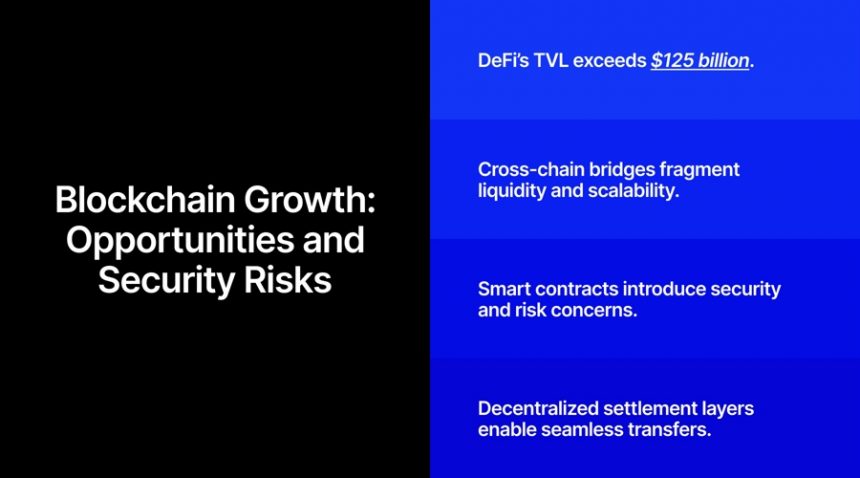Cross-border transactions are costing companies over $120 billion per year in transaction fees, a report by Oliver Wyman and J.P. Morgan found. In spite of great fintech advances, conventional payment systems are still inefficient.
Although originally designed as a platform to support decentralized cryptocurrencies, blockchain is emerging as a dynamic tool that can be used to greatly improve B2B cross-border payments.
It can significantly reduce transaction costs and dependency on intermediary banks, as well as increase speed and security by promoting direct peer-to-peer transactions on a protected distributed ledger.
Within B2B cross-border payments, blockchain can act as a decentralized payment rail. With automated compliance checks through the use of smart contracts and custom transaction tracking, it can enable businesses to perform transfers directly across borders in minutes.
As blockchain-based payment systems become adopted by fintech companies, the industry is currently at a turning point. Will regulation complexities and slower integration stand in the way of blockchain truly reshaping the future of B2B payments?
The Challenges of Traditional B2B Cross-Border Payments
Global B2B payments are still processed through an older, dated infrastructure despite improvements within fintech. Some significant problems hindering this include:
High Costs
Most companies are researching B2B payment solutions to streamline costs and speed up transactions. International remittance complexities typically affect many intermediary banks, each charging its own processing fees.
Foreign exchange (FX) markups by banks and financial institutions also add additional fees to transactions.
Key cost factors include:
- Charges from intermediary banking accumulate at every point in the transaction.
- Foreign exchange markups over their total costs.
- Regulatory compliance charges are an added cost of cross-border payments.
Settlement Delays
Cross-border B2B payments are settled for an average of two to five business days, usually due to time zones, bank holidays, and manual authentication procedures. The SWIFT network, utilized by over 11,000 institutions, has several steps, each with failure points and delays.
This inefficiency creates cash flow issues and increases counterparty risks for international companies. The rising cost of cross-border transactions has generated a need for alternative payment methods, such as stablecoins and blockchain settlements.
Lack of Transparency
Many standard B2B payments are based on unseen banking processes without real-time tracking. Consumer payments benefit from innovations like real-time payment networks, but cross-border business transactions still rely on traditional systems. Consequently, after initiating the payment, businesses hardly have any idea where the funds are at any point in time. The lack of transparency can lead to:
- Payment status uncertainties.
- Increased fraud risks.
- Restructuring issues for international companies.
— Chainlink (@chainlink) May 14, 2025
Compliance Barriers
The limitations of anti-money laundering (AML), know-your-customer (KYC), as well as counter-terrorist financing (CTF) can be quite restricting for cross-border B2B transactions. Regulations differ in each jurisdiction, and companies must go through a complex web of compliance requirements.
Sanctions violations must be screened through transactions by financial institutions, which is time-consuming. The ever-changing nature of the regulations means that companies must continually update compliance systems, and this naturally adds to the expense of administrative costs and operating expenses.
The Blockchain and AI Revolution
Blockchain technology can combat these challenges within B2B payments by offering decentralized, transparent, and efficient payment systems. The biggest advantages of making use of blockchain-based B2B payments are:
Lowering Costs
Blockchain eliminates the presence of intermediaries like correspondent banks, minimizing the cost of transactions in conventional payment systems. In contrast to SWIFT-based transfers where both parties are served a portion of the transaction fee, blockchain transactions take place over a P2P (peer-to-peer) network that minimizes cost significantly.
Faster Settlement Times
Blockchain payment technologies decrease cross-border payment delays from multiple days to just minutes, which unlike the multi-step payment processes of traditional payment systems, revolutionizes fintech cross-border innovation.
This is how cryptocurrencies and stablecoins like USDC (USD Coin) and USDT (Tether) facilitate faster payments between companies. Ethereum and Solana networks have been shown to be able to sustain high-speed, large-scale transactions without bank authorization, making them perfect for B2B settlements.
Transparency & Security
Blockchain employs a distributed ledger technology (DLT) to store all the transactions in an open, fixed ledger. This degree of transparency thus enables businesses to see transactions in real-time, minimizing the scope for fraud and inefficiency in reconciliations. Compared to traditional banking infrastructure, where transaction histories might have been hidden due to banking regulations, blockchain provides an unerasable history of transactions.
Smart Contracts
Blockchain payment solutions can also facilitate compliance automation via smart contracts, self-executing contracts with coded instructions to execute based on regulatory requirements.
The contracts can automate AML and KYC checks prior to a transaction, enhancing the regulatory compliance of blockchain payments. Some blockchain networks have incorporated compliance-friendly frameworks to make regulatory adoption easier.
AI-Powered Fraud Detection
Artificial intelligence (AI) is being increasingly used in blockchain payments to provide greater anti-fraud capability and regulatory reporting. AI-powered systems can analyze transaction behavior in real time, detect suspicious behavior, and stop fraudulent payments from being sent.
Cyber crime Unit Hyderabad city as a part Cyber Jaagrookta Diwas conducted cyber awareness program about Parcel Scam&digital arrest, trading, APK files, Crypto currency, part time job& Investment, OTP, customer care, other social media trolling at State Bank of India Patny centre pic.twitter.com/AaS67Suloj
— Cyber Crimes PS Hyd City Police (@CyberCrimeshyd) March 5, 2025
AI improves payment automation through cash management optimization, predicting delays, and automating transactional flows reconciliation. AI and blockchain together offer greater security levels and business operational efficiency improvement in B2B payments.
The Future of Blockchain in B2B Payments
The Rise of Stablecoins in B2B Transactions
Stablecoins, digital currencies pledged against money, are emerging as a solution of choice for effortless B2B payments. The world’s biggest banks and fintech giants, such as Bank of America, Standard Chartered, PayPal, Revolut, and Stripe, are moving into a space long dominated by Tether and Circle.
With increasing regulatory support, stablecoins provide a quicker, cheaper alternative to traditional banking systems. Regulators now tackle concerns about stablecoin adoption, clearing the way for its inclusion in the global financial system.
Institutional Adoption
Financial institutions are realizing the potential of how blockchain technology can improve payment systems. The advances align with a trend of mainstream financial institutions embracing blockchain technology in business with the objective of improving efficiency, security, and transparency for B2B payments.
Notable institutional blockchain initiatives include:
- UBS Digital Cash: Investigating blockchain automatic settlements based on smart contracts.
- Mastercard Crypto Expansion: Issuing crypto debit cards and verification platforms.
- Kinexys by JP Morgan Blockchain: Building institutional-sized blockchain networks for cross-border payments.
CBDCs and the Future of Government-Issued Digital Currencies
World central banks are looking into the implementation of digital forms of their domestic currencies, or Central Bank Digital Currencies (CBDCs). The digital currency will be a safe, low-cost, and efficient payment medium that can replace cash and upgrade the payment system. CBDCs could bypass intermediaries in payments to reduce expenses and enhance speed.
Blockchain and Traditional Banking: Can They Coexist?
Blockchain must be able to seamlessly integrate with standard financial systems for it to be applied successfully in mass within B2B payments. Projects like mBridge are a central bank initiative that aims to enable instant, peer-to-peer cross-border payments in the form of CBDCs.
Meanwhile, solutions for seamless payments across different platforms are being designed by companies like Visa. For instance, cross-chain interoperability solutions which allows CBDCs to work with Real-Time Payments (RTP) systems. All these developments are leading us to wider blockchain adoption in traditional finance.
Incoming Regulations
As B2B payments shift more toward blockchain, regulators are syncing the compliance frameworks. Whereas AML/KYC and CBDC regulations remain divided, efforts such as the Atlantic Council’s digital asset policy roadmap are working towards creating international standards.
Policymakers are also seeking frameworks to bring CBDCs, stablecoins, and blockchain payments under a common legal framework. Regulatory sandboxes are empowering fintech companies to test blockchain solutions in pilot environments before implementing them on a full scale.
Case Studies: How Blockchain is Transforming B2B Payments
Santander’s Blockchain Payments via RippleNet
Santander, one of the biggest banking groups in Europe, is using RippleNet to enable cross-border payments via its One Pay FX service. The blockchain technology enables Santander to settle payments in seconds, whereas the usual 3–5 business days for SWIFT-based payments are required.
Santander launched a blockchain-based foreign exchange service that uses Ripple’s technology. https://t.co/oPSPDuAP3N pic.twitter.com/YNTO3kt2k9
— CNBC (@CNBC) April 28, 2018
The bank has shown cost savings on cross-border remittances, proving the economic advantage of using blockchain.
IBM’s World Wire: A Cross-Border Payment Solution for Banks
IBM’s World Wire uses the Stellar blockchain to enable cross-border payments between banks. The platform makes it possible for companies to pay in various digital assets, including stablecoins, offering a safe and regulatory-compliant payment method outside the traditional payment networks.
World Wire has gone global, promoting financial inclusion and reducing global payment flows. Blockchain is revolutionizing B2B payments by offering reduced costs, quicker settlements, and improved transparency.
Cross-border transactions are costing companies over $120 billion per year in transaction fees, a report by Oliver Wyman and J.P. Morgan found. In spite of great fintech advances, conventional payment systems are still inefficient.
Although originally designed as a platform to support decentralized cryptocurrencies, blockchain is emerging as a dynamic tool that can be used to greatly improve B2B cross-border payments.
It can significantly reduce transaction costs and dependency on intermediary banks, as well as increase speed and security by promoting direct peer-to-peer transactions on a protected distributed ledger.
Within B2B cross-border payments, blockchain can act as a decentralized payment rail. With automated compliance checks through the use of smart contracts and custom transaction tracking, it can enable businesses to perform transfers directly across borders in minutes.
As blockchain-based payment systems become adopted by fintech companies, the industry is currently at a turning point. Will regulation complexities and slower integration stand in the way of blockchain truly reshaping the future of B2B payments?
The Challenges of Traditional B2B Cross-Border Payments
Global B2B payments are still processed through an older, dated infrastructure despite improvements within fintech. Some significant problems hindering this include:
High Costs
Most companies are researching B2B payment solutions to streamline costs and speed up transactions. International remittance complexities typically affect many intermediary banks, each charging its own processing fees.
Foreign exchange (FX) markups by banks and financial institutions also add additional fees to transactions.
Key cost factors include:
- Charges from intermediary banking accumulate at every point in the transaction.
- Foreign exchange markups over their total costs.
- Regulatory compliance charges are an added cost of cross-border payments.
Settlement Delays
Cross-border B2B payments are settled for an average of two to five business days, usually due to time zones, bank holidays, and manual authentication procedures. The SWIFT network, utilized by over 11,000 institutions, has several steps, each with failure points and delays.
This inefficiency creates cash flow issues and increases counterparty risks for international companies. The rising cost of cross-border transactions has generated a need for alternative payment methods, such as stablecoins and blockchain settlements.
Lack of Transparency
Many standard B2B payments are based on unseen banking processes without real-time tracking. Consumer payments benefit from innovations like real-time payment networks, but cross-border business transactions still rely on traditional systems. Consequently, after initiating the payment, businesses hardly have any idea where the funds are at any point in time. The lack of transparency can lead to:
- Payment status uncertainties.
- Increased fraud risks.
- Restructuring issues for international companies.
— Chainlink (@chainlink) May 14, 2025
Compliance Barriers
The limitations of anti-money laundering (AML), know-your-customer (KYC), as well as counter-terrorist financing (CTF) can be quite restricting for cross-border B2B transactions. Regulations differ in each jurisdiction, and companies must go through a complex web of compliance requirements.
Sanctions violations must be screened through transactions by financial institutions, which is time-consuming. The ever-changing nature of the regulations means that companies must continually update compliance systems, and this naturally adds to the expense of administrative costs and operating expenses.
The Blockchain and AI Revolution
Blockchain technology can combat these challenges within B2B payments by offering decentralized, transparent, and efficient payment systems. The biggest advantages of making use of blockchain-based B2B payments are:
Lowering Costs
Blockchain eliminates the presence of intermediaries like correspondent banks, minimizing the cost of transactions in conventional payment systems. In contrast to SWIFT-based transfers where both parties are served a portion of the transaction fee, blockchain transactions take place over a P2P (peer-to-peer) network that minimizes cost significantly.
Faster Settlement Times
Blockchain payment technologies decrease cross-border payment delays from multiple days to just minutes, which unlike the multi-step payment processes of traditional payment systems, revolutionizes fintech cross-border innovation.
This is how cryptocurrencies and stablecoins like USDC (USD Coin) and USDT (Tether) facilitate faster payments between companies. Ethereum and Solana networks have been shown to be able to sustain high-speed, large-scale transactions without bank authorization, making them perfect for B2B settlements.
Transparency & Security
Blockchain employs a distributed ledger technology (DLT) to store all the transactions in an open, fixed ledger. This degree of transparency thus enables businesses to see transactions in real-time, minimizing the scope for fraud and inefficiency in reconciliations. Compared to traditional banking infrastructure, where transaction histories might have been hidden due to banking regulations, blockchain provides an unerasable history of transactions.
Smart Contracts
Blockchain payment solutions can also facilitate compliance automation via smart contracts, self-executing contracts with coded instructions to execute based on regulatory requirements.
The contracts can automate AML and KYC checks prior to a transaction, enhancing the regulatory compliance of blockchain payments. Some blockchain networks have incorporated compliance-friendly frameworks to make regulatory adoption easier.
AI-Powered Fraud Detection
Artificial intelligence (AI) is being increasingly used in blockchain payments to provide greater anti-fraud capability and regulatory reporting. AI-powered systems can analyze transaction behavior in real time, detect suspicious behavior, and stop fraudulent payments from being sent.
Cyber crime Unit Hyderabad city as a part Cyber Jaagrookta Diwas conducted cyber awareness program about Parcel Scam&digital arrest, trading, APK files, Crypto currency, part time job& Investment, OTP, customer care, other social media trolling at State Bank of India Patny centre pic.twitter.com/AaS67Suloj
— Cyber Crimes PS Hyd City Police (@CyberCrimeshyd) March 5, 2025
AI improves payment automation through cash management optimization, predicting delays, and automating transactional flows reconciliation. AI and blockchain together offer greater security levels and business operational efficiency improvement in B2B payments.
The Future of Blockchain in B2B Payments
The Rise of Stablecoins in B2B Transactions
Stablecoins, digital currencies pledged against money, are emerging as a solution of choice for effortless B2B payments. The world’s biggest banks and fintech giants, such as Bank of America, Standard Chartered, PayPal, Revolut, and Stripe, are moving into a space long dominated by Tether and Circle.
With increasing regulatory support, stablecoins provide a quicker, cheaper alternative to traditional banking systems. Regulators now tackle concerns about stablecoin adoption, clearing the way for its inclusion in the global financial system.
Institutional Adoption
Financial institutions are realizing the potential of how blockchain technology can improve payment systems. The advances align with a trend of mainstream financial institutions embracing blockchain technology in business with the objective of improving efficiency, security, and transparency for B2B payments.
Notable institutional blockchain initiatives include:
- UBS Digital Cash: Investigating blockchain automatic settlements based on smart contracts.
- Mastercard Crypto Expansion: Issuing crypto debit cards and verification platforms.
- Kinexys by JP Morgan Blockchain: Building institutional-sized blockchain networks for cross-border payments.
CBDCs and the Future of Government-Issued Digital Currencies
World central banks are looking into the implementation of digital forms of their domestic currencies, or Central Bank Digital Currencies (CBDCs). The digital currency will be a safe, low-cost, and efficient payment medium that can replace cash and upgrade the payment system. CBDCs could bypass intermediaries in payments to reduce expenses and enhance speed.
Blockchain and Traditional Banking: Can They Coexist?
Blockchain must be able to seamlessly integrate with standard financial systems for it to be applied successfully in mass within B2B payments. Projects like mBridge are a central bank initiative that aims to enable instant, peer-to-peer cross-border payments in the form of CBDCs.
Meanwhile, solutions for seamless payments across different platforms are being designed by companies like Visa. For instance, cross-chain interoperability solutions which allows CBDCs to work with Real-Time Payments (RTP) systems. All these developments are leading us to wider blockchain adoption in traditional finance.
Incoming Regulations
As B2B payments shift more toward blockchain, regulators are syncing the compliance frameworks. Whereas AML/KYC and CBDC regulations remain divided, efforts such as the Atlantic Council’s digital asset policy roadmap are working towards creating international standards.
Policymakers are also seeking frameworks to bring CBDCs, stablecoins, and blockchain payments under a common legal framework. Regulatory sandboxes are empowering fintech companies to test blockchain solutions in pilot environments before implementing them on a full scale.
Case Studies: How Blockchain is Transforming B2B Payments
Santander’s Blockchain Payments via RippleNet
Santander, one of the biggest banking groups in Europe, is using RippleNet to enable cross-border payments via its One Pay FX service. The blockchain technology enables Santander to settle payments in seconds, whereas the usual 3–5 business days for SWIFT-based payments are required.
Santander launched a blockchain-based foreign exchange service that uses Ripple’s technology. https://t.co/oPSPDuAP3N pic.twitter.com/YNTO3kt2k9
— CNBC (@CNBC) April 28, 2018
The bank has shown cost savings on cross-border remittances, proving the economic advantage of using blockchain.
IBM’s World Wire: A Cross-Border Payment Solution for Banks
IBM’s World Wire uses the Stellar blockchain to enable cross-border payments between banks. The platform makes it possible for companies to pay in various digital assets, including stablecoins, offering a safe and regulatory-compliant payment method outside the traditional payment networks.
World Wire has gone global, promoting financial inclusion and reducing global payment flows. Blockchain is revolutionizing B2B payments by offering reduced costs, quicker settlements, and improved transparency.







